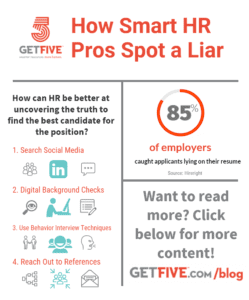Your ATS just pulled what appears to be the perfect candidate. Education, experience, accolades, awards — you start to get excited, but something doesn’t feel quite right. Your gut is telling you something is off and that this applicant might be taking some liberties with their resume.
Catching a candidate lying is not a rare occurrence. A whopping 85 percent of employers caught people fibbing on their applications, according to HireRight’s 2017 employment screening benchmark report.
One reason people are fibbing at such high rates may be the ATS itself. Job hunters know the rigorous filters that hiring managers set, and they want to do everything they can so they’re not red-flagged and placed in the digital trash can.
Granted, this doesn’t make lying right, it just means recruiters and HR professionals need to be that much more diligent so they can uncover the truth to really discover the best candidate for the position.
So how can you do this? Check out these smart methods for spotting a liar:
Search social media:

Cross reference information on the application with information on Facebook, LinkedIn, Twitter, etc. It’s an easy step that can reveal a lot of similarities or discrepancies. Bonus: You’ll likely get additional information that gives you a more personal look into a candidate’s interests and persona to ensure a good cultural fit.
Do digital background checks:
Many companies offer detailed reports on candidates, including validating employment history, degrees, certifications, awards, criminal records, and much more. This will cost a few bucks, but it can be worthwhile for peace of mind. Note: When conducting background checks, make sure to comply with local laws regarding applicant information. For example, 11 states have legislation that limits the use of employment credit checks.
Use behavioral interview techniques:
Lying on paper, even if it is digital paper, is easy. Lying in person is another ballgame. When you interview a candidate in person, utilize behavioral interview methods to reveal truths. If a candidate has a decade of management experience, you should be able to ask any number of questions and get confident, detailed responses. If the applicant gives short or vague answers while avoiding eye contact, you may have discovered a liar.
Reach out to references:
Take the time to call the references provided by the candidate and dig deep to get meaningful answers, not just what they may have been coached to say. What’s more, if unsure about the answers, consider reaching out to past colleagues and supervisors to get their insight on the applicant in question. LinkedIn makes it pretty easy to see who’s connected, so a friendly note inquiring about the candidate can’t hurt. (Just make sure it’s past connections. You would never want to email a candidate’s current boss.)
These basic steps should help you discover any lies that may impact your hiring decisions. In the end your goal remains the same: hire the best person for the role.









